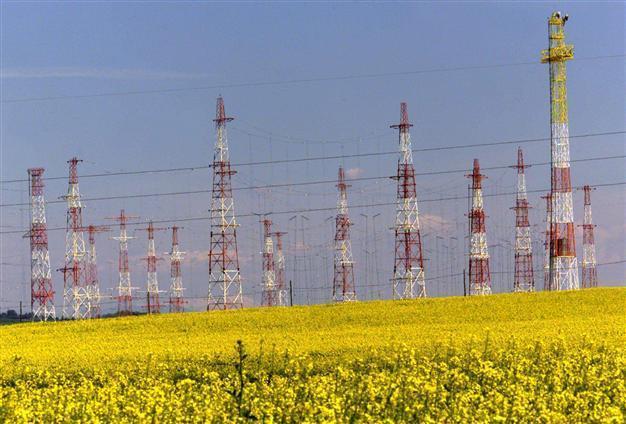Analysis: Turkey on verge of becoming major power, gas market
LONDON - Reuters

Hürriyet Photo
Turkey is likely to overtake Britain as Europe's third-biggest electricity consumer within a decade and become an
energy trading hub, capitalising on its booming population and economy as well as its proximity to cheap natural gas resources.
Its rise to prominence in energy markets will add to its growing influence as a major economic and political player between Central Asia, the Middle East and the European Union, to which Ankara aspires membership.
At 75 million and growing, Turkey's population is set to overtake Germany's, currently the EU's biggest at 82 million, by 2025. Its economy has been booming for years, although the crisis in Europe has slowed its rate of growth.
The government is keen to develop Turkey into the benchmark electricity market for trading in spot and derivatives contracts for southeast Europe and much of central Asia.
"As a bridge between Asia and Europe, Turkey has the potential to develop a reference price for this region," said Turkish Energy Ministry Undersecretary Metin Kilci.
Total Turkish energy consumption rose by 9.2 percent to 118.8 million tonnes of oil equivalent in 2011 from 2010, the highest annual growth rate in all of Europe and Eurasia, according to BP's latest statistical review.
This compared with an average 0.5 percent drop in energy consumption in the region as a whole.
"Turkey's potential is huge. With an increasingly young and urban population, there's a very strong growth outlook, and the energy demand is expected to double by 2023," said Naz Masraff, an analyst at political risk consultancy Eurasia Group.
Its annual power demand is currently around 210 terawatt-hours (TWh), and the government says it expects demand to rise at an annual rate of 6 to 9 percent between 2009 and
2023.
Such growth rates would catapult its power demand to levels comparable with Britain's, the EU's third-highest electricity consumer behind Germany and France.
To attract the investment needed to increase its power capacity to deal with the booming demand, the Turkish government has liberalised its electricity market.
Jayesh Parmar, a partner in financial and energy consultancy Baringa, said Turkey could become one of Europe's most attractive power markets.
"Turkey is very close to a number of new gas sources (e.g. Iraq, Azerbaijan), and because of the rate of development and the scale of population growth which is driving consumption, the gas-to-power market is extremely attractive, arguably one of the more attractive markets currently in Europe for power generation," he said.
German-based European Energy Exchange (EEX) and Turkish power transmission company TEIAS signed a memorandum of understanding early in July to cooperate on the establishment of an energy exchange in Turkey.
Iris Weidinger, EEX's chief financial officer, said EEX had been talking to Turkish partners for some time, because it considered the region a promising growth market. Turkey needs to expand its fleet of power plants and transmission networks, with foreign investors playing a role, she added.
"Setting up an exchange is the next logical step," she said.
Energy Ministry official Kilci said, "The establishment of a Turkish Energy Exchange with liquid power spot and derivatives markets is crucial for the successful liberalisation and further growth of the electricity markets."
ADVANCED LIBERALISATION Analysts say the liberalisation of Turkey's power markets has made them attractive to foreign investors.
"The Turkish electricity market has taken a lot of steps towards liberalization and reorganisation," said Richard Sarsfield-Hall, a principal at energy consultancy Poyry who has advised energy companies on entering the Turkish market.
Major utilities have begun eying Turkey for expansion.
E.ON, Germany's largest, has been focusing on Turkey, although its potential energy partnership with Turkey's Dogus Holding has yet to materialise.
RWE, E.ON's biggest competitor in Germany, is due to complete the 500 million euro ($615.4 million) Denizli gas-to-power turbine project this year, with a 775 megawatt (MW) capacity.
Verbund, Austria's biggest utility, jointly operates power distributor and renewable energy firm Enerjisa with local partner company Sabanci Holding.
Verbund plans for the venture's generation capacity to amount to 5,000 MW, or 10 percent of Turkey's installed total, by 2015.
KEY GAS TRANSIT HUB In natural gas, Turkey is also set to become a major European transit hub for Gazprom. The Russian giant already supplies around 40 percent of the EU's gas needs, and it sees Turkey as vital to the future growth of its gas exports. Turkey has few natural energy resources of its own. But with its geographical position between the European Union, Central Asia and the Middle East, the country lies at the centre of nearly all proposed gas pipelines that would link Central Asia to Europe, defining the regional market for decades to come.
"Gazprom has several supply contracts with Turkey, which is of special importance (to Gazprom)," said Sergei Komlev, head of contract structuring and price formation at Gazprom Export.
Turkey will also be key in transporting Azeri gas to Europe. Azerbaijan plans to export around 16 bcm of gas from 2017, with 6 bcm designated for Turkey and 10 for the EU.
In the longer term, Turkey also could act as a transit route for gas flowing to Europe from Iraq, Turkmenistan and Iran. It also has access to the eastern Mediterranean basin, where large reserves of natural gas have been recently discovered.
More problematic is Turkey's fast growing domestic
gas market, which unlike its power market is less liberalised and still largely controlled by a state company, BOTAS.
"In the Turkish electricity market, things look far more positive than in the gas market," Poyry's Sarsfield-Hall said.
"In the gas sector the imports haven't been privatised yet, so the Turkish pipeline operator BOTAS is still the main importer. and this has an impact on gas supplies to power plants. It becomes more difficult," Eurasia's Masraff said. ($1 = 0.8126 euros)
